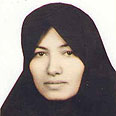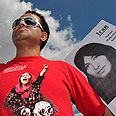Sakineh Mohammadi Ashtiani (43), the Iranian woman condemned to death by stoning after being found guilty of adultery is now facing a different excruciating punishment: 99 lashes. The reason is that she ostensibly published her picture in the UK's Times of London without a hijab (head covering), though she is not even the woman in the picture.
According to her son Sajjad Qaderzadeh, she was condemned to be flogged for "spreading corruption and immodesty."
Under Attack
French President Nicolas Sarkozy's wife slandered by Iranian media for protesting stoning sentence to be imposed on Iranian woman convicted of adultery
Qaderzadeh claimed he heard about the latest punishment from prisoners who were recently released from the prison in which his mother is held, in Tabriz in northwest Iran. If the reports are confirmed, it appears the authorities have responded to the international campaign to free Ashtiani with a warning: The one who'll suffer the consequences is Ashtiani herself.
The accusations are even more unusual because the picture published in the Times under her name is not even hers. The photo is in fact that of human rights activist Susan Hajarat, an Iranian exile living in Sweden. It seems her picture was published on a website next to an article about stoning, which caused the confusion.
The British newspaper apologized and claimed that Ashtiani's lawyer Mohammad Mostafaei had provided the photo which he received from Ashtiani's son, though Qaderzadeh denies this claim.
'Excuse to abuse'
In a notice released during the weekend, Qaderzadeh said the Iranian authorities are exploiting the mistake as an excuse to abuse his mother.
"As far as we know, the punishment has not yet been carried out," he said. "As soon as we received the newspaper's apology, we informed the lawyer and we intend to appeal."
He added that his mother has not been permitted visitors for the last two weeks – not even her family or lawyer – and she is forbidden to telephone.
Last month the Iranian authorities compelled Ashtiani to appear on television and "confess" to her crimes. During the broadcast she also denounced her lawyer for taking advantage of her case for his own ends. Sources close to Ashtiani said she had undergone daily torture before the television appearance, and had read her "confession" from text dictated to her.
- Follow Ynetnews on Facebook

Sakineh Mohammadi Ashtiani

Demonstrators in Britain call for Ashtiani's release
Photo: AFP
מומלצים















